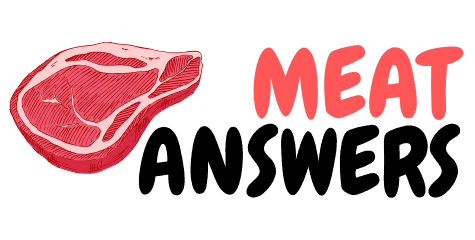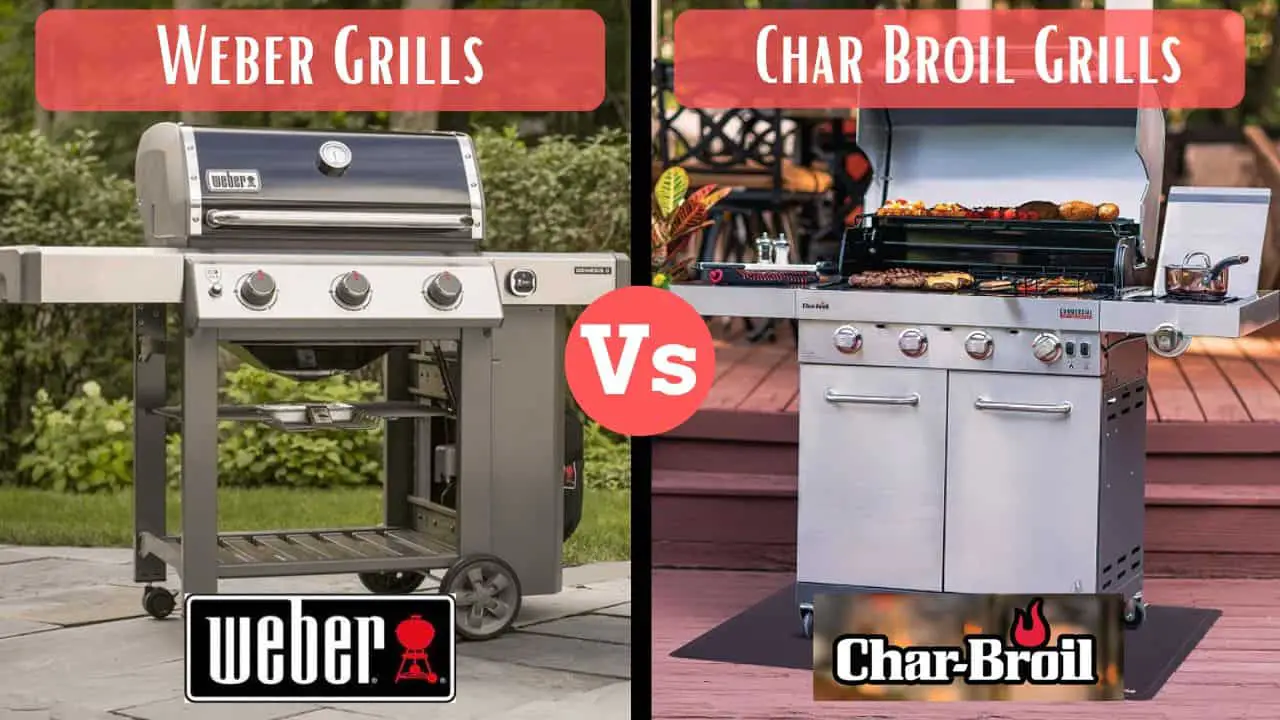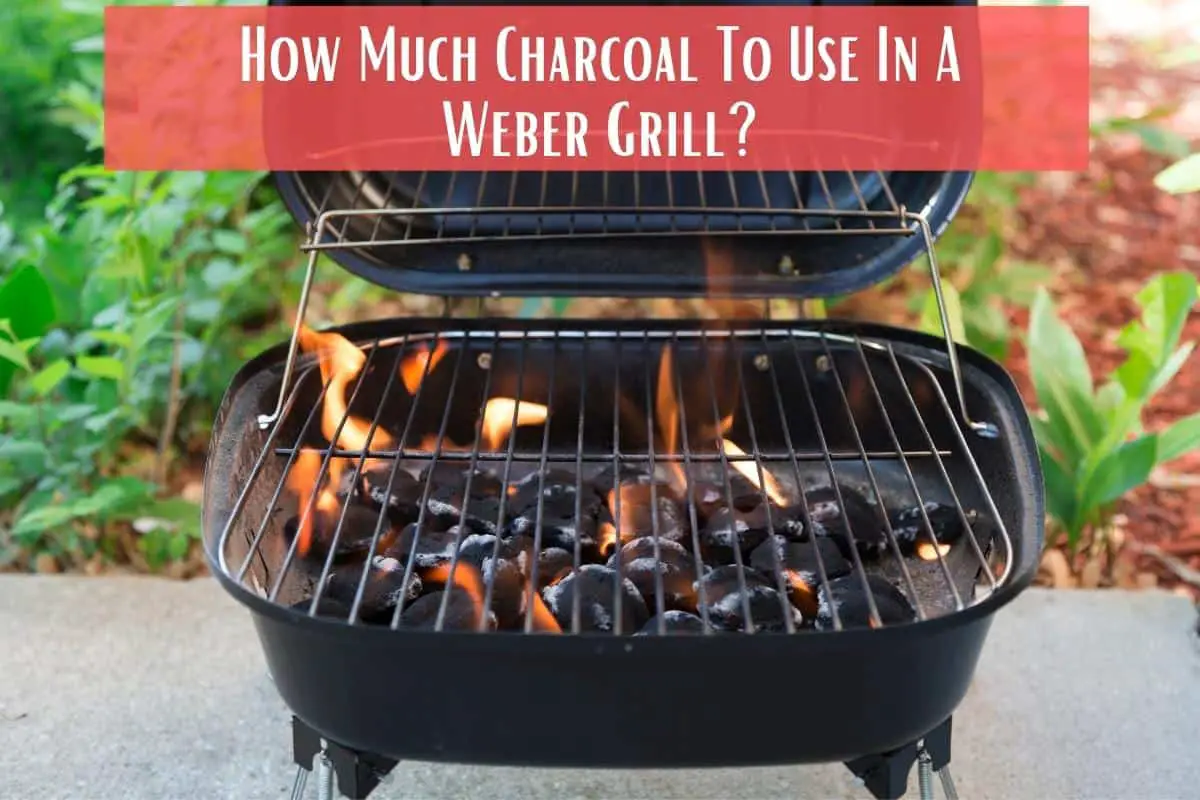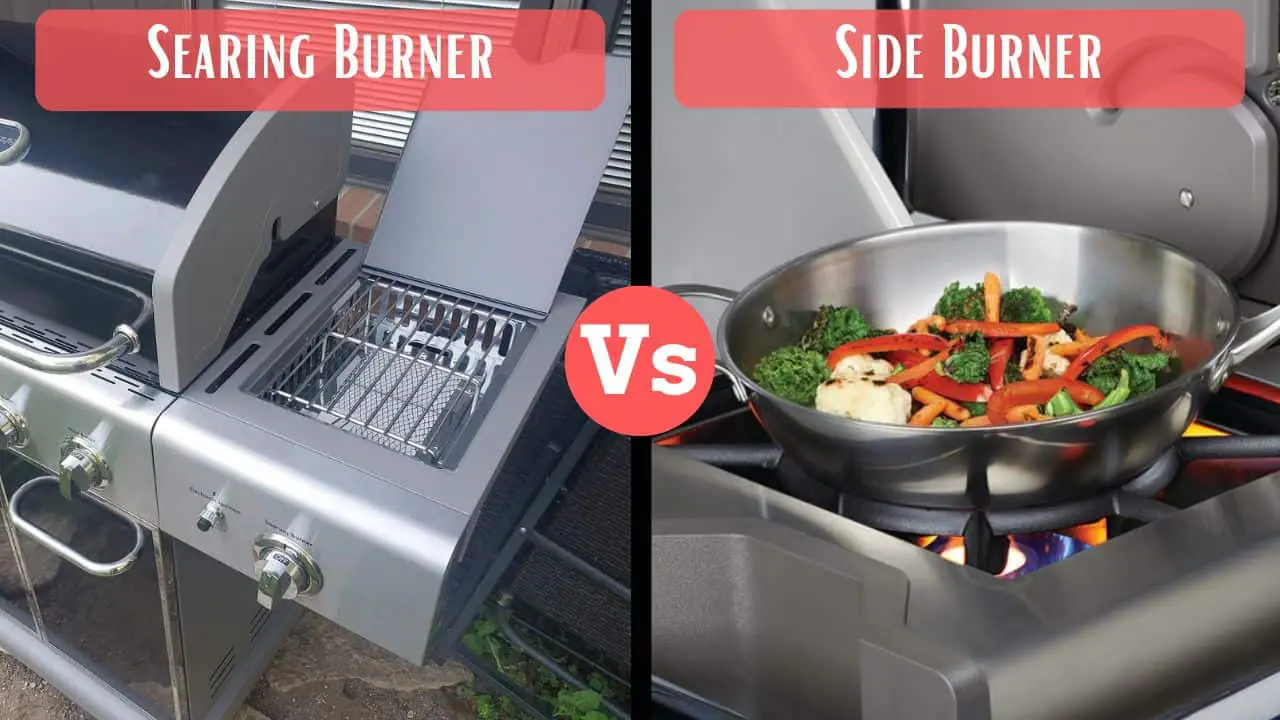I usually take a break from grilling during the colder months but want to continue the trend this year in the winter.
What I am wondering is if cold weather affects a propane grill, and the necessary tips and maintenance.
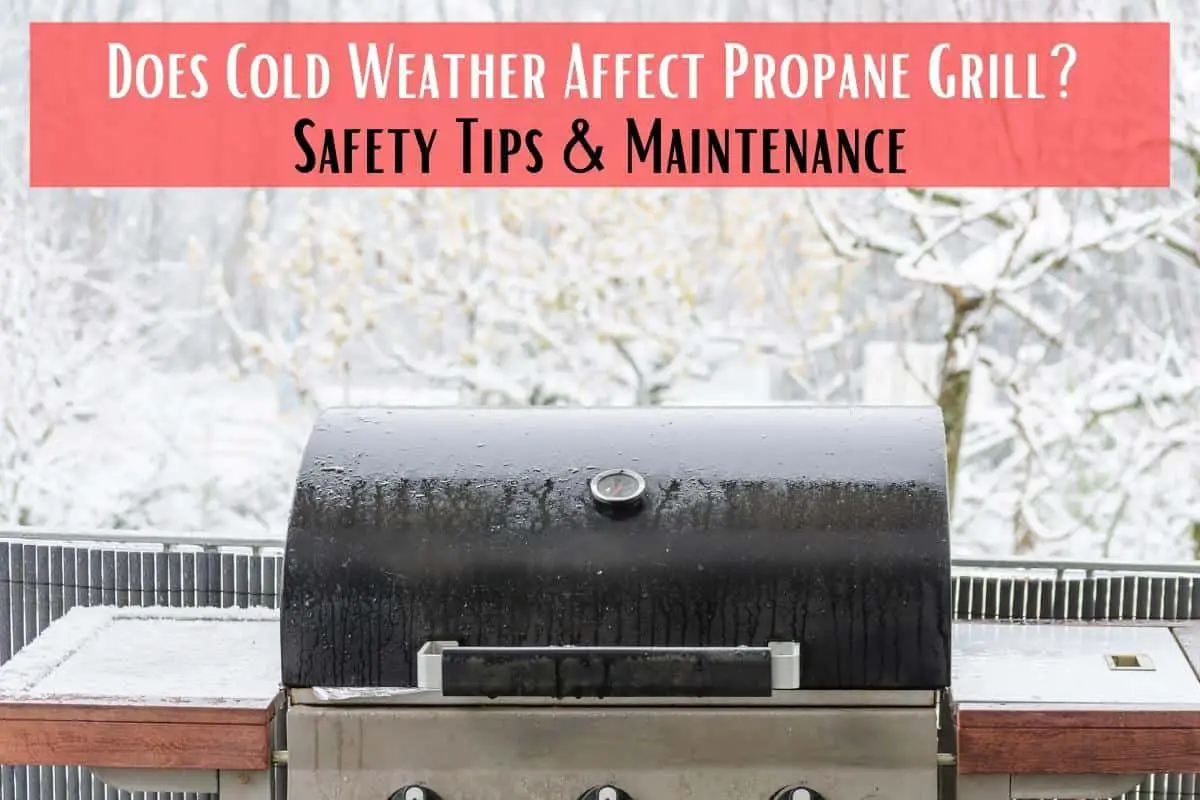
You can use propane to grill in the winter, but you need to be more careful because propane stays at a liquid state at -44 degrees Fahrenheit, and doesn’t turn into gas to fuel your grill.
Table of Contents
- 1 Does Cold Weather Affect Propane Grill?
- 2 Can You Actually Use a Propane Grill in Cold Weather?
- 3 How Cold is Too Cold for a Propane Grill?
- 4 Tips for Using Propane Grill in Cold Weather
- 5 How Does Cold Affect Propane Tanks?
- 6 How to Safely Use Propane Tanks in Cold Weather?
- 7 What to do if Propane Grill doesn’t Work in Cold Weather?
- 8 How to Warm Propane Tanks in Cold Weather?
- 9 Guidelines to Protect Propane Supply to Grill from Tanks in Cold Weather
- 10 Can I Leave My Propane Grill Outside in the Winter?
Does Cold Weather Affect Propane Grill?
The short answer is yes, cold weather does affect a propane grill in several ways. Grilling using propane is possible in the winter, but there are certain challenges, starting from the process itself to how the grill and fuel behave.
1. Heating Time
When you grill in the summertime, you almost guarantee to achieve the right cook time, but your grill will take longer to heat up in cold weather. This means that it will take longer for the grill to heat up in cold weather than warm weather.
2. Fuel Use
It goes without saying that if your grill takes longer to heat up, it will use more fuel. Your grill will work overtime to heat up and use more fuel during the process to maintain the temperature you want, so you’ll run out of fuel faster.
3. Cooking Time
Owing to the fact your grill will take longer to heat up, and the fluctuation of the grill’s temperature with colder weather outside, your food will take longer to cook, therefore you will have to make adjustments to your cooking time.
4. Ignition
Propane is an ignitable gas above -44 degrees Fahrenheit but is a liquid at temperatures colder than that, so temperatures below -44 degrees won’t ignite your grill.
Can You Actually Use a Propane Grill in Cold Weather?
You can grill in cold weather, but there are a few ways to do it right. Cold weather brings high winds, which is another good reason for the drop in temperature.
Passing winds can also lead to unstable heat in the propane grill, and can even cause a sudden drop in temperature. For this reason, I suggest refraining from using your propane grill on a windy day or creating barriers around the grill to block the winds.
When grilling in cold weather, it’s a good idea to grill with the lid closed, as doing so will retain heat, and prevents cold air from entering the grill.
Adding to this, if you open the lid of your propane grill often, you risk using more gas, which can turn into an expensive grilling session. If you get over these minor caveats, you can use your propane grill in cold weather.
How Cold is Too Cold for a Propane Grill?
At -44 degrees Fahrenheit, great chances are that you probably won’t feel like going outside to grill anyways.
But even if you’re determined to head out to grill in this near-freezing temperature, grilling on a propane grill just isn’t going to work.
Propane won’t transform from a liquid state to gas to power your grill when it’s -44 degrees outside.
But that’s not all, the gauge on your propane tank may provide incorrect readings in freezing temperatures, so you’ll basically be wasting more fuel and cash.
If you really want to indulge in grilled food when the weather is cold outside, you can use a smoker with pellets instead, because this type of grill connects to your home electrical outlet.
Tips for Using Propane Grill in Cold Weather
Using a propane grill in cold weather isn’t as challenging as you think, and here are a few tips for smooth winter grilling on your propane grill.
1. First things first, you will have to allow extra prep and preheating time during the winter months. It’s also advisable to always keep an extra full propane tank handy when using a propane grill, especially during the winter, because the gas burns faster during this time.
2. It gets darker earlier in the winter, so if you don’t have a grill that has lights such as certain models from the Napoleon hangar, it’s a good idea to have extra illumination in the grilling area.
3. Use a cover to block winds, and don’t open the grill often when grilling in chilly weather.
4. Just like you winterize your vehicle to use it in cold weather, there are a few ways to winterize your grill too and keep it functioning at its best.
Cleaning and oiling are the two most important things to do, and you can use vegetable or canola oil to lubricate the grill grates during the cold weather season.
Before using your grill in the winter, inspect the burners, gas lines, and jets for blockages that can restrict gas flow, and check the hoses for any cracks.
If you notice the lid and knobs are frozen shut, move the grill to your shed, garage, or any other warm place to defrost.
You can defrost the grill faster using a hairdryer, but never attempt to force open the grill or try to turn a frozen knob, because you may cause damage to the grill.
5. Maintaining a snow-free zone around the area where you will be grilling protects your grill from rust.
You can use a shovel to clear the snow, and paper towels to dry all the surfaces of the grill.
6. If you want your propane grill to retain heat and use less fuel in the winter, you can invest in certain products like a grill jacket to reduce fuel costs.
The Oklahoma Joe’s grill jacket fits most grills and provides year-round insulation for consistent cooking temperatures.
It is crafted from a silicone-coated fabric and arrives complete with fiberglass insulation and aluminum liner.
If you can’t get your hands on a grill jacket, you can use a welding blanket or furnace insulation to insulate your grill.
7. When grilling food in colder temperatures, you don’t want to be out there very long, so choose food items that cook faster such as burgers, and avoid cooking thick steaks. Choosing food that cooks faster will also use less fuel.
8. A great way to retain heat in cold temperatures is by using cast iron grill grates. If your grill came with stainless steel or aluminum grates, you can swap them for cast iron grill grates.
9. There are fewer daylight hours in the colder months than in the summer, so start grilling when it’s a little warmer outside during these hours.
If you plan to grill after dark, you can install an outdoor propane heater to keep you and your company warm.
10. While this may seem obvious, you should bundle up and stay comfortable when grilling in chilly weather. But take care that the winter clothing you wear like scarfs is not too long to touch the fire of the grill.
How Does Cold Affect Propane Tanks?
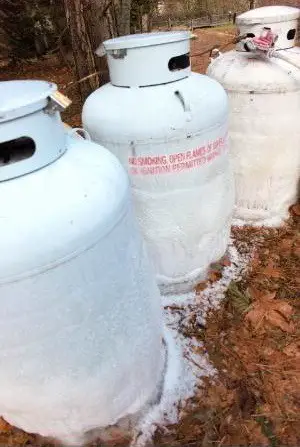
You’re aware that propane freezes at -44 degrees Fahrenheit, but that’s not the end of the story. When temperatures are really low, the volume of propane inside your tank will shrink, resulting in a loss of pressure.
And if the pressure becomes too low, the gas in your propane tank will not be able to reach your grill, so you probably won’t be able to run your propane grill.
How to Safely Use Propane Tanks in Cold Weather?
Propane is a great source of fuel for your grill, but don’t take it for granted. Here are some key tips to safely use your propane tank in cold weather.
- Educate all the adults in your home on how to shut off the power supply at your propane tank.
- Always store the propane tank outdoors and never in your basement, garage, shed, or any indoor space.
- Even though it might sound like a good idea, NEVER use your propane grill indoors because the carbon monoxide the grill emits is potentially deadly.
- Check your local forecast before you grill, and avoid using your grill if there’s a winter storm warning.
What to do if Propane Grill doesn’t Work in Cold Weather?
Check the level of propane
If your propane tank is out of gas, your grill won’t work in any weather. There are several ways to check the level of propane in your tank
The easiest way of pouring warm water over the tank, and running your hand along the side of the tank to check where the temperature is cool to the touch when you reach the level of propane in the tank.
A fuel gauge is a much more accurate way of checking the level of propane in your tank, and you should ideally have this handy in your grilling arsenal.
These fuel gauges are highly affordable and are compatible with all appliances, and with propane tanks from 5 lbs to 40 lbs.
Check the burners
The burners of your grill may have frozen in cold weather, therefore won’t ignite. The quickest way to defrost the burners is by taking the grill into your garage or shed, and either leaving it there for a while or using a blow dryer to unfreeze the grill.
Replace the gas grill pressure regulator
The pressure regulator of your propane grill is prone to wear and tear over time and can be replaced easily. Before replacing the pressure regulator, try resetting it first by shutting off the gas supply valve at the tank, disconnecting the regulator at the tank, waiting 30 seconds, and reconnecting the regulator.
Follow the proper starting procedure
You may want to check whether you’re starting the grill the right way, which can vary across manufacturers.
Some grills come with battery igniters, while others with push-button igniters, so check if these are in good working order when you fire up the grill.
How to Warm Propane Tanks in Cold Weather?
Store the propane tank properly
There’s often a little confusion when it comes to storing a propane tank. It’s best to store your propane tank in a cool, well-ventilated area, but not in a temperature-regulated area like a garage or basement. Store your propane tank in a shaded, dry area outdoors.
Keep it warm
When storing your propane tank outdoors in the winter, keep the tank free from any ice, sleet, or snow buildup.
Cover the propane tank with a blanket
You can cover your propane tank with a blanket to prevent it from freezing, but uncover the tank when the sun comes out.
Guidelines to Protect Propane Supply to Grill from Tanks in Cold Weather
The best way to protect the propane supply to the grill in cold weather is by clearing the accumulated snow and ice on the various components of the grill.
If the components of the power supply are frozen, do not use an open flame to heat them, but bring the grill in your garage and shed and let it defrost.
Can I Leave My Propane Grill Outside in the Winter?
You can leave your propane tank outside in the winter, but keep it in a shaded area. Adding to this, make sure the propane tank is disconnected from your grill if you’ve finished grilling for the season.
The location you choose to store your propane tanks should be out of direct exposure to the sun, and shouldn’t receive temperatures that exceed 120-degrees Fahrenheit.
Propane tanks that are exposed to high temperatures witness an increase in pressure inside the tank, which can cause the safety valve to blow off to prevent the tank from exploding,
However, in the event this happens, there will be a slight leak of gas escaping from the propane tank.
Before storing your propane tank, inspect it for any signs of wear and leaks. If you aren’t familiar with the process of checking your propane tank for leaks, have it looked at by your local gas technician.
And most importantly, keep your propane tank full when storing it in the winter, as it reduces the risk of condensation buildup, which may taint liquid propane.
